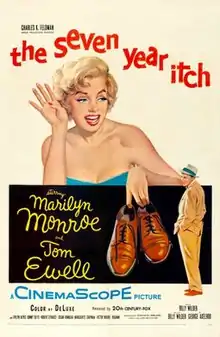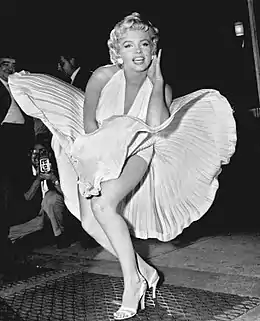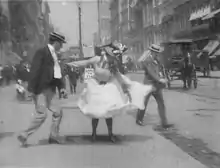The Seven Year Itch
The Seven Year Itch is a 1955 American romantic comedy film based on a 1952 three-act play with the same name by George Axelrod. The film was co-written and directed by Billy Wilder, and stars Marilyn Monroe and Tom Ewell, reprising his Broadway role from the play. It contains one of the most notable images of the 20th century – Monroe standing on a subway grate as her white dress is blown upwards by a passing train.[1] The titular phrase, which refers to declining interest in a monogamous relationship after seven years of marriage, has been used by psychologists.[2]
| The Seven Year Itch | |
|---|---|
 Theatrical release poster | |
| Directed by | Billy Wilder |
| Produced by | Charles K. Feldman Billy Wilder |
| Written by | George Axelrod Billy Wilder |
| Based on | The Seven Year Itch by George Axelrod |
| Starring | Marilyn Monroe Tom Ewell |
| Music by | Alfred Newman |
| Cinematography | Milton R. Krasner |
| Edited by | Hugh S. Fowler |
Production company | |
| Distributed by | 20th Century-Fox |
Release date |
|
Running time | 105 minutes |
| Country | United States |
| Language | English |
Plot
Richard Sherman (Tom Ewell) is a middle-aged publishing executive with an overactive imagination, whose wife, Helen (Evelyn Keyes), and son, Ricky, are spending the summer in Maine. When he returns home from the train station with the kayak paddle Ricky accidentally left behind, he meets a woman (Marilyn Monroe), who is a commercial actress and former model who rents the apartment upstairs while in town to make television spots for a brand of toothpaste. That evening, he works on reading the manuscript of a book in which psychiatrist Dr. Brubaker (Oskar Homolka) claims that almost all men are driven to have extra-marital affairs in the seventh year of marriage. Sherman has an imaginary conversation with Helen, trying to convince her, in three fantasy sequences, that he is irresistible to women, including his secretary, a nurse, and Helen's bridesmaid, but she laughs it off. A tomato plant then crashes into his lounge chair; the woman upstairs apologizes for accidentally knocking it off the balcony, and Richard invites her down for a drink.

While he waits for her to arrive, he vacillates between a fantasy of her as a femme fatale overcome by his playing of Rachmaninoff's Second Piano Concerto, and guilt at betraying his wife. When she does come down, she is wearing pink pajamas and turns out to be a naive and innocent young woman. On his suggestion, she brings back a bottle of champagne from her apartment and returns in a white dress. Richard, overcome by his fantasies, awkwardly grabs at her while they are playing "Chopsticks" together on the piano, causing them to fall off the piano bench. He apologizes, but she says it happens to her all the time. Guilt-ridden, however, he asks her to leave.
The next day at work, Richard is distracted by the fear that Helen will find out about his indiscretion, though Helen is none the wiser and just wants Richard to send Ricky his paddle so he can use the kayak. Richard's waning resolve to resist temptation fuels his fear that he is succumbing to the "Seven Year Itch". He seeks help from Dr. Brubaker, who has come into the office to discuss his book, but to no avail.
When he keeps hearing of his wife spending time with her writer friend McKenzie in Maine, Richard imagines that they are carrying on an affair, and he decides to invite the young woman out to dinner and a movie. After seeing The Creature from the Black Lagoon, she stands over the subway grate to experience the breeze – Monroe in the iconic scene in the pleated white halterneck dress, blowing her skirt in the wind. He lets her stay the night in his air-conditioned apartment (her upstairs apartment is uncooled) so that she will be well-rested for a television appearance the next day.
The next morning, Richard comes to his senses, and fearing his wife's retribution (which he imagines in a fantasy scene), he tells the young woman she can stay in his apartment, and runs off, paddle in hand, to catch the next train to Maine to be with Helen and Ricky.
Cast

- Marilyn Monroe as The Girl (credited as such, though Richard Sherman satirically remarks "maybe she's Marilyn Monroe")
- Tom Ewell as Richard Sherman (billed as Tommy Ewell)
- Evelyn Keyes as Helen Sherman
- Sonny Tufts as Tom MacKenzie
- Robert Strauss as Kruhulik
- Oscar Homolka as Dr. Brubaker
- Marguerite Chapman as Miss Morris
- Victor Moore as Plumber
- Donald MacBride as Mr. Brady
- Roxanne as Elaine
- Carolyn Jones as Nurse Finch
- Tom Nolan as Ricky Sherman (uncredited)
- Doro Merande as Waitress at Vegetarian Restaurant (uncredited)
- Kathleen Freeman as Woman at Vegetarian Restaurant (uncredited)
Soundtrack
| Song[3] | Performer(s) | Note(s) |
|---|---|---|
| "Piano Concerto No. 2" | Gary Graffman, Leonard Bernstein, & the NYPO[4] | Played on a record and often in the score |
| "Sentimental Journey" | — | Played often in the score |
| "Chopsticks" | Marilyn Monroe and Tom Ewell | — |
Production


The Seven Year Itch was filmed between September and November 1954, and is the only Billy Wilder film released by 20th Century-Fox.
The characters of Elaine (Dolores Rosedale), Marie, and the inner voices of Sherman and The Girl were dropped from the play; the characters of the Plumber, Miss Finch (Carolyn Jones), the Waitress (Doro Merande), and Kruhulik the janitor (Robert Strauss) were added. Many lines and scenes from the play were cut or re-written because they were deemed indecent by the Hays office. Axelrod and Wilder complained that the film was being made under straitjacketed conditions. This led to a major plot change: in the play, Sherman and The Girl have sex; in the movie, the romance is reduced to suggestion; Sherman and the Girl kiss twice, once outside the movie theater, the other time before Sherman goes to take Ricky's paddle to him.
The footage of Monroe's dress billowing over a subway grate was shot twice: the first take was shot on location outside the Trans-Lux 52nd Street Theater, then located at 586 Lexington Avenue in Manhattan, while the second take was on a sound stage. Both eventually made their way into the finished film, despite the often-held belief that the original on-location footage's sound had been rendered useless by the overexcited crowd present during filming in New York.
The exterior shooting location of Richard's apartment was 164 East 61st Street in Manhattan.[7]
Release
Box office
The film earned $6 million in rentals at the North American box office.[8]
Critical response
The original 1955 review by Variety was largely positive. Though Hollywood production codes prohibited writer-director Billy Wilder from filming a comedy where adultery takes place, the review expressed disappointment that Sherman remains chaste.[9] Some critics compared Richard Sherman to the fantasizing lead character in James Thurber's short story "The Secret Life of Walter Mitty".[10]
Review aggregation website Rotten Tomatoes gives the film an approval rating of 87% based on 30 reviews and an average score of 7.2/10.[11]
In the 1970s Wilder called the movie "a nothing picture because the picture should be done today without censorship... Unless the husband, left alone in New York while the wife and kid are away for the summer, has an affair with that girl there's nothing. But you couldn't do that in those days, so I was just straitjacketed. It just didn't come off one bit, and there's nothing I can say about it except I wish I hadn't made it. I wish I had the property now."[12]
Awards and honors
| Date of ceremony | Award | Category | Recipients and nominees | Result |
|---|---|---|---|---|
| January 29, 1956[13][14] | Directors Guild of America Award | Outstanding Directorial Achievement in Motion Pictures | Billy Wilder | Nominated |
| February 23, 1956[15][16] | Golden Globe Awards | Best Actor – Motion Picture Musical or Comedy | Tom Ewell | Won |
In 2000, American Film Institute included the film as No. 51 in AFI's 100 Years...100 Laughs.[17]
See also
- List of American films of 1955
- Forever Marilyn – a giant statue of Monroe in the white dress, by John Seward Johnson II
References
- "The Seven Year Itch". Rotten Tomatoes. Retrieved October 30, 2008.
- Dalton, Aaron (January 1, 2000). "The Ties That Unbind". Psychology Today. Retrieved December 31, 2016.
- "The Seven Year Itch (1955): Soundtracks". IMDb. Retrieved November 9, 2014.
- https://www.amazon.com/Rachmaninov-Goes-Movies-Sergey/dp/B0000029WH
- Rosemary Hanes with Brian Taves. "Moving Image Section – Motion Picture, Broadcasting and Recorded Sound Division" The Library of Congress. Retrieved January 5, 2011.
- Lee Grieveson, Peter Krämer. The silent cinema reader (2004) ISBN 0-415-25283-0, 0-415-25284-9, Tom Gunning "The Cinema of Attractions" p. 46. Retrieved January 5, 2011.
- The Cad
- "All Time Domestic Champs", Variety, January 6, 1960, p. 34.
- Variety Staff (January 1, 1955). "The Seven Year Itch". Variety. Reviews. Archived from the original on August 11, 2016. Retrieved October 30, 2008.
- Schildcrout, Jordan (2019). In the Long Run: A Cultural History of Broadway's Hit Plays. New York and London: Routledge. p. 103. ISBN 978-0367210908.
- The Seven Year Itch at Rotten Tomatoes
- "Conversations with Billy Wilder & I.A.L. Diamond [Part 8]" November 28, 2011 by Scott Go Into the Story accessed May 28, 2014
- "Directors Guild of America, USA: Awards for 1956". IMDb. Retrieved November 10, 2014.
- "8th Annual DGA Awards: Honoring Outstanding Directorial Achievement for 1955 – Winners and Nominees – Feature Film". DGA. Retrieved November 10, 2014.
- "The Envelope: Past Winners Database – 1955 13th Golden Globe Awards". Los Angeles Times. Archived from the original on May 17, 2007. Retrieved November 10, 2014.
- "The 13th Annual Golden Globe Awards (1956)". hfpa.org. Retrieved November 23, 2014.
- "AFI's 100 Years...100 Laughs" (PDF). American Film Institute. 2002. Retrieved August 27, 2016.
External links
| Wikiquote has quotations related to: The Seven Year Itch |
| Wikimedia Commons has media related to The Seven Year Itch. |
- The Seven Year Itch at IMDb
- The Seven Year Itch at AllMovie
- The Seven Year Itch at the TCM Movie Database
- The Seven Year Itch
- The Seven Year Itch at Rotten Tomatoes
- The Seven Year Itch review at Variety
- Cinema Retro article on the famous subway breeze scene
- "George Axelrod and The Great American Sex Farce" at The Cad
- The Seven Year Itch famous subway breeze scene becomes a twenty-six foot tall statue in 2011
- “Marilyn Monroe's Long-Lost Skirt Scene” – January 26, 2017, piece on Studio 360
- Marilyn Monroe on the set of The Seven Year Itch in 1954 by Photographer George Barris